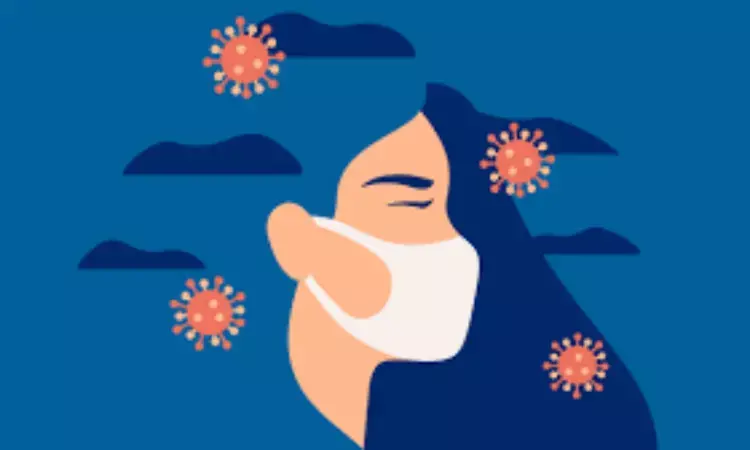- Home
- Medical news & Guidelines
- Anesthesiology
- Cardiology and CTVS
- Critical Care
- Dentistry
- Dermatology
- Diabetes and Endocrinology
- ENT
- Gastroenterology
- Medicine
- Nephrology
- Neurology
- Obstretics-Gynaecology
- Oncology
- Ophthalmology
- Orthopaedics
- Pediatrics-Neonatology
- Psychiatry
- Pulmonology
- Radiology
- Surgery
- Urology
- Laboratory Medicine
- Diet
- Nursing
- Paramedical
- Physiotherapy
- Health news
- Fact Check
- Bone Health Fact Check
- Brain Health Fact Check
- Cancer Related Fact Check
- Child Care Fact Check
- Dental and oral health fact check
- Diabetes and metabolic health fact check
- Diet and Nutrition Fact Check
- Eye and ENT Care Fact Check
- Fitness fact check
- Gut health fact check
- Heart health fact check
- Kidney health fact check
- Medical education fact check
- Men's health fact check
- Respiratory fact check
- Skin and hair care fact check
- Vaccine and Immunization fact check
- Women's health fact check
- AYUSH
- State News
- Andaman and Nicobar Islands
- Andhra Pradesh
- Arunachal Pradesh
- Assam
- Bihar
- Chandigarh
- Chattisgarh
- Dadra and Nagar Haveli
- Daman and Diu
- Delhi
- Goa
- Gujarat
- Haryana
- Himachal Pradesh
- Jammu & Kashmir
- Jharkhand
- Karnataka
- Kerala
- Ladakh
- Lakshadweep
- Madhya Pradesh
- Maharashtra
- Manipur
- Meghalaya
- Mizoram
- Nagaland
- Odisha
- Puducherry
- Punjab
- Rajasthan
- Sikkim
- Tamil Nadu
- Telangana
- Tripura
- Uttar Pradesh
- Uttrakhand
- West Bengal
- Medical Education
- Industry
People with Post-COVID-19 Condition Face Higher Psychiatric Symptom Prevalence, reveals JAMA study

Covid-19 Now Endemic in India
Researchers have found that US adults with post-COVID-19 condition (PCC) experience higher rates of psychiatric symptoms, including depression and anxiety, as well as cognitive and sleep difficulties, compared to those without Post–COVID-19 Condition. Additionally, individuals with PCC are more likely to encounter cost-related barriers when seeking mental health care, according to a study analyzing data from the 2022 National Health Interview Survey (NHIS). This study was published in JAMA Network Open by Hiten N. and colleagues.
Post–COVID-19 condition, commonly known as long COVID, is characterized by new symptoms following SARS-CoV-2 infection that last more than three months and continue to affect patients' lives. While there has been growing awareness of physical symptoms associated with PCC, less is known about the prevalence of psychiatric symptoms in this population. This study aims to assess the prevalence of psychiatric symptoms in US adults with PCC and evaluate their access to treatment.
The study utilized data from the 2022 NHIS, a nationally representative cross-sectional survey. The analysis included 25,122 participants, representing approximately 231 million US adults. Depression and anxiety symptoms were assessed using the Patient Health Questionnaire-8 (PHQ-8) and General Anxiety Disorder-7 (GAD-7) instrument, respectively. Participants were also asked about sleep difficulties, cognitive difficulties, disabling fatigue, and cost-related barriers to mental health care.
The key findings of the study were:
• The weighted prevalence of PCC in the study population was 3.4% (95% CI, 3.1%-3.6%).
• Participants with PCC had higher rates of depression symptoms (16.8% vs 7.1%; adjusted odds ratio [AOR], 1.96) and anxiety symptoms (16.7% vs 6.3%; AOR, 2.21) compared to those without PCC.
• Sleep difficulties (41.5% vs 22.7%; AOR, 1.95), cognitive difficulties (35.0% vs 19.5%; AOR, 2.04), and disabling fatigue (4.0% vs 1.6%; AOR, 1.85) were also more prevalent in the PCC group.
• Among participants with depression or anxiety, individuals with PCC had a similar likelihood of not receiving treatment (wPr, 28.2% vs 34.9%). However, they were more likely to report cost-related barriers to accessing mental health counseling or therapy (37.2% vs 23.3%; AOR, 2.05).
The study highlights the higher prevalence of psychiatric symptoms among individuals with PCC and the increased likelihood of experiencing cost-related barriers to accessing therapy. These findings suggest the need for care pathways for PCC to prioritize mental health screening and affordable treatment options. By addressing these challenges, healthcare providers can better support individuals with PCC and improve their overall quality of life.
Reference:
Naik H, Tran KC, Staples JA, Perlis RH, Levin A. Psychiatric Symptoms, Treatment Uptake, and Barriers to Mental Health Care Among US Adults With Post–COVID-19 Condition. JAMA Netw Open. 2024;7(4):e248481. doi:10.1001/jamanetworkopen.2024.8481
Dr Riya Dave has completed dentistry from Gujarat University in 2022. She is a dentist and accomplished medical and scientific writer known for her commitment to bridging the gap between clinical expertise and accessible healthcare information. She has been actively involved in writing blogs related to health and wellness.
Dr Kamal Kant Kohli-MBBS, DTCD- a chest specialist with more than 30 years of practice and a flair for writing clinical articles, Dr Kamal Kant Kohli joined Medical Dialogues as a Chief Editor of Medical News. Besides writing articles, as an editor, he proofreads and verifies all the medical content published on Medical Dialogues including those coming from journals, studies,medical conferences,guidelines etc. Email: drkohli@medicaldialogues.in. Contact no. 011-43720751


